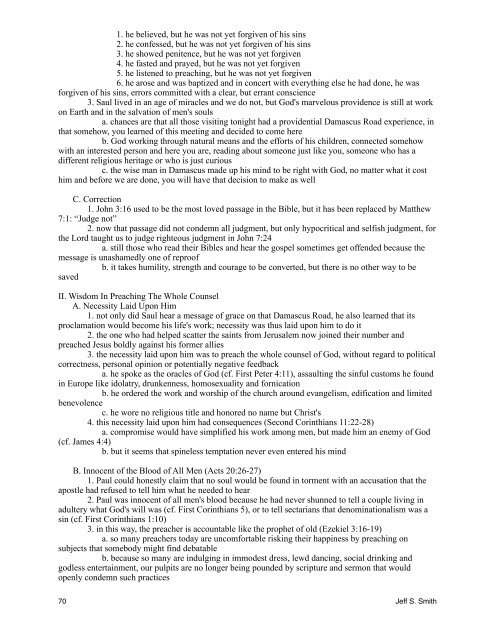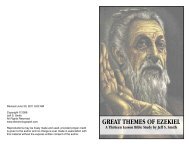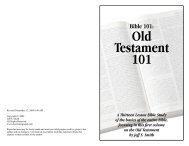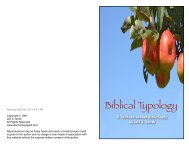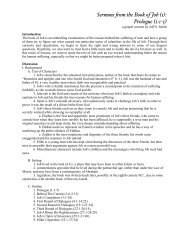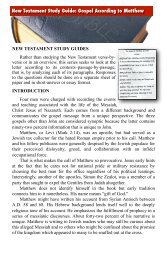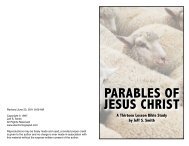Character Studies - ElectronicGospel
Character Studies - ElectronicGospel
Character Studies - ElectronicGospel
- No tags were found...
You also want an ePaper? Increase the reach of your titles
YUMPU automatically turns print PDFs into web optimized ePapers that Google loves.
1. he believed, but he was not yet forgiven of his sins2. he confessed, but he was not yet forgiven of his sins3. he showed penitence, but he was not yet forgiven4. he fasted and prayed, but he was not yet forgiven5. he listened to preaching, but he was not yet forgiven6. he arose and was baptized and in concert with everything else he had done, he wasforgiven of his sins, errors committed with a clear, but errant conscience3. Saul lived in an age of miracles and we do not, but God's marvelous providence is still at workon Earth and in the salvation of men's soulsa. chances are that all those visiting tonight had a providential Damascus Road experience, inthat somehow, you learned of this meeting and decided to come hereb. God working through natural means and the efforts of his children, connected somehowwith an interested person and here you are, reading about someone just like you, someone who has adifferent religious heritage or who is just curiousc. the wise man in Damascus made up his mind to be right with God, no matter what it costhim and before we are done, you will have that decision to make as wellC. Correction1. John 3:16 used to be the most loved passage in the Bible, but it has been replaced by Matthew7:1: “Judge not”2. now that passage did not condemn all judgment, but only hypocritical and selfish judgment, forthe Lord taught us to judge righteous judgment in John 7:24a. still those who read their Bibles and hear the gospel sometimes get offended because themessage is unashamedly one of reproofb. it takes humility, strength and courage to be converted, but there is no other way to besavedII. Wisdom In Preaching The Whole CounselA. Necessity Laid Upon Him1. not only did Saul hear a message of grace on that Damascus Road, he also learned that itsproclamation would become his life's work; necessity was thus laid upon him to do it2. the one who had helped scatter the saints from Jerusalem now joined their number andpreached Jesus boldly against his former allies3. the necessity laid upon him was to preach the whole counsel of God, without regard to politicalcorrectness, personal opinion or potentially negative feedbacka. he spoke as the oracles of God (cf. First Peter 4:11), assaulting the sinful customs he foundin Europe like idolatry, drunkenness, homosexuality and fornicationb. he ordered the work and worship of the church around evangelism, edification and limitedbenevolencec. he wore no religious title and honored no name but Christ's4. this necessity laid upon him had consequences (Second Corinthians 11:22-28)a. compromise would have simplified his work among men, but made him an enemy of God(cf. James 4:4)b. but it seems that spineless temptation never even entered his mindB. Innocent of the Blood of All Men (Acts 20:26-27)1. Paul could honestly claim that no soul would be found in torment with an accusation that theapostle had refused to tell him what he needed to hear2. Paul was innocent of all men's blood because he had never shunned to tell a couple living inadultery what God's will was (cf. First Corinthians 5), or to tell sectarians that denominationalism was asin (cf. First Corinthians 1:10)3. in this way, the preacher is accountable like the prophet of old (Ezekiel 3:16-19)a. so many preachers today are uncomfortable risking their happiness by preaching onsubjects that somebody might find debatableb. because so many are indulging in immodest dress, lewd dancing, social drinking andgodless entertainment, our pulpits are no longer being pounded by scripture and sermon that wouldopenly condemn such practices70! Jeff S. Smith


